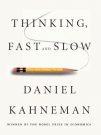Thaler’s Bias
As everyone knows, Richard Thaler has won the Nobel Prize in economics. Thaler’s prize was mainly for behavioral economics, which built upon the work of the earlier nobel laureate Daniel Kanneman.
This work has been controversial. Many rational choice economists have strongly criticized it and some of those people have been free market advocates. But free market advocates come in different stripes and certainly the Austrians would criticize the rational choice perspective as well. For an interesting exchange on these matters, take a look at this symposium on behavioral economics on the Truth on the Market Blog and the response from Richard Thaler himself.
While I find some of the work of the behavioral economists quite interesting, my main concern is with their failure to apply the same methods to government in general and to administrative agencies in particular. What could possibly justify this failure other than political bias?
I have been writing about this for a long time. See, e.g. this post from 2012. Happily, this failure is increasingly receiving attention.
One of the participants in the Truth on the Market Blog argued that the same behavioral economics assumptions that are applied to private markets would change the law applied to administrative agencies. He gives the example of equitable estoppel:
To demand private firms hold consumers harmless for their irrationality is to ignore that behaviorally-informed administrative law would, or should (in a world of undivided light and perfect intellectual consistency) do so as well. Are behavioralists prepared to call for robust equitable estoppel against government agencies with superior information that provide information to consumers? This, of course, is merely a narrow, trivial example; the entire construction of the Administrative Procedure Act presumed rational – or super-rational – technocrats capable of “solving big problems;” to broach the possibility of individual irrationality at the regulatory level is both a new heresy and a very, very old one.
While this example involves “a narrow, trivial example,” that example is similar to the type of private sector issues that behavioral economics has been applied to.
The bigger problem in the government sector is when government officials must evaluate government policies. The most significant issue here is that of ideological or political bias. Ilya Somin, who has complaints similar to mine about Thaler, cites to a study of Danish politicians who evaluated information on two schools. When the schools were listed as school A and school B, the politicians analyzed the information correctly. When the schools were listed as “private school” and “public school,” the politicians who favored private schools mistakenly drew inferences in favor of the private school. The same bias was exhibited by politicians who favored public schools.
As David Henderson writes in the Wall Street Journal:
Mr. Thaler has yet to apply in a serious way his theory of irrationality to government officials. Their bad decisions are even worse because citizens bear most of the costs. It would be great if Mr. Thaler explored this area more. Someone should nudge him.

